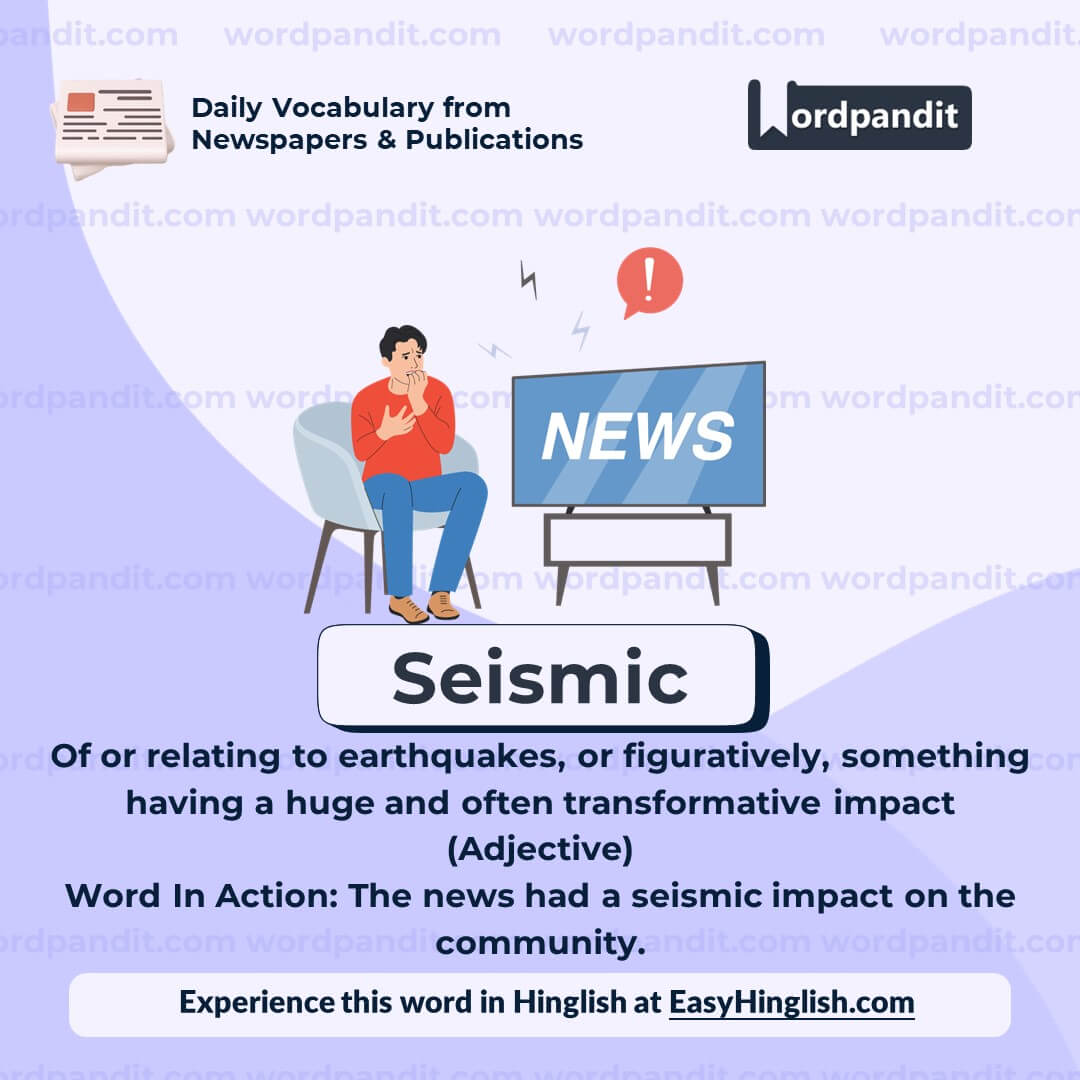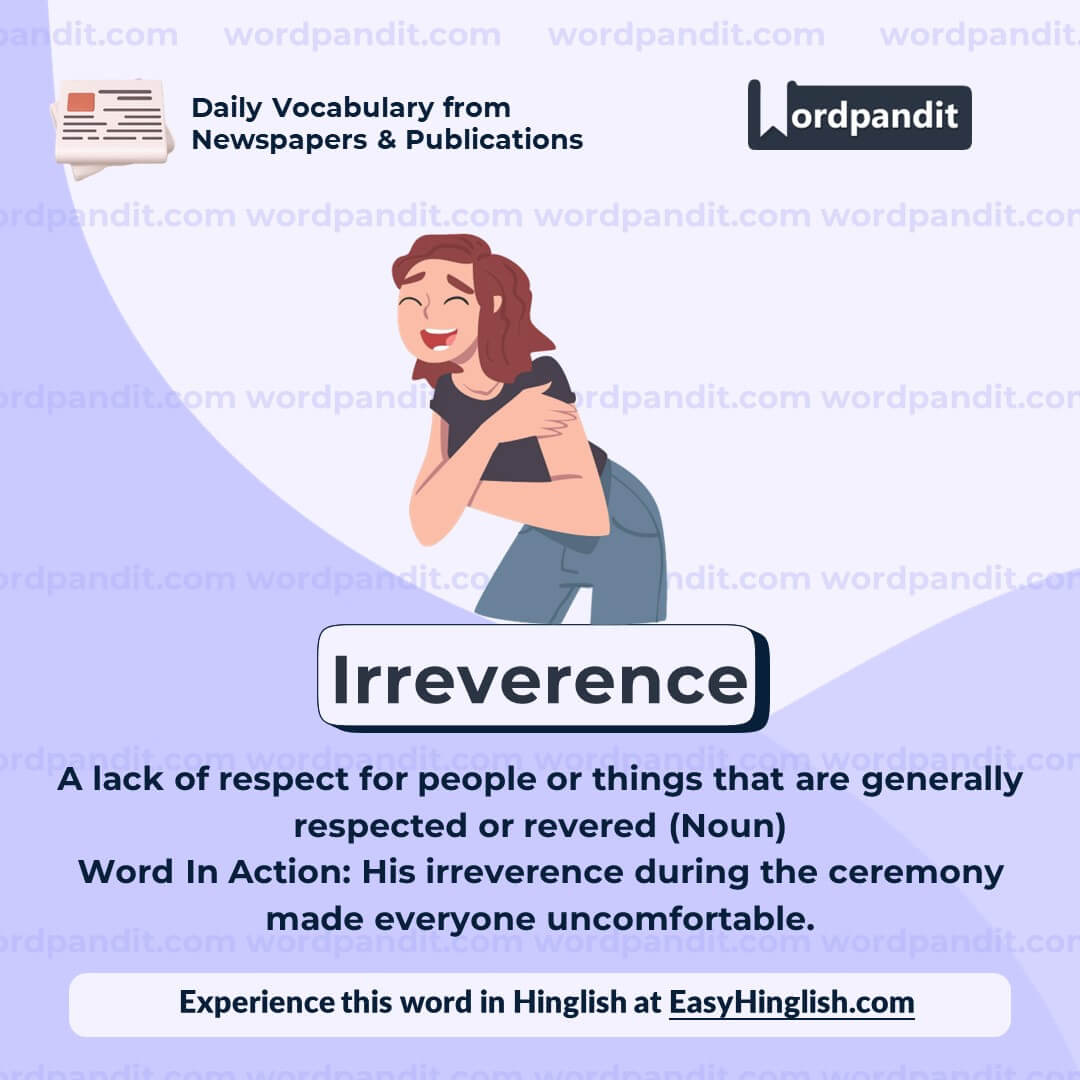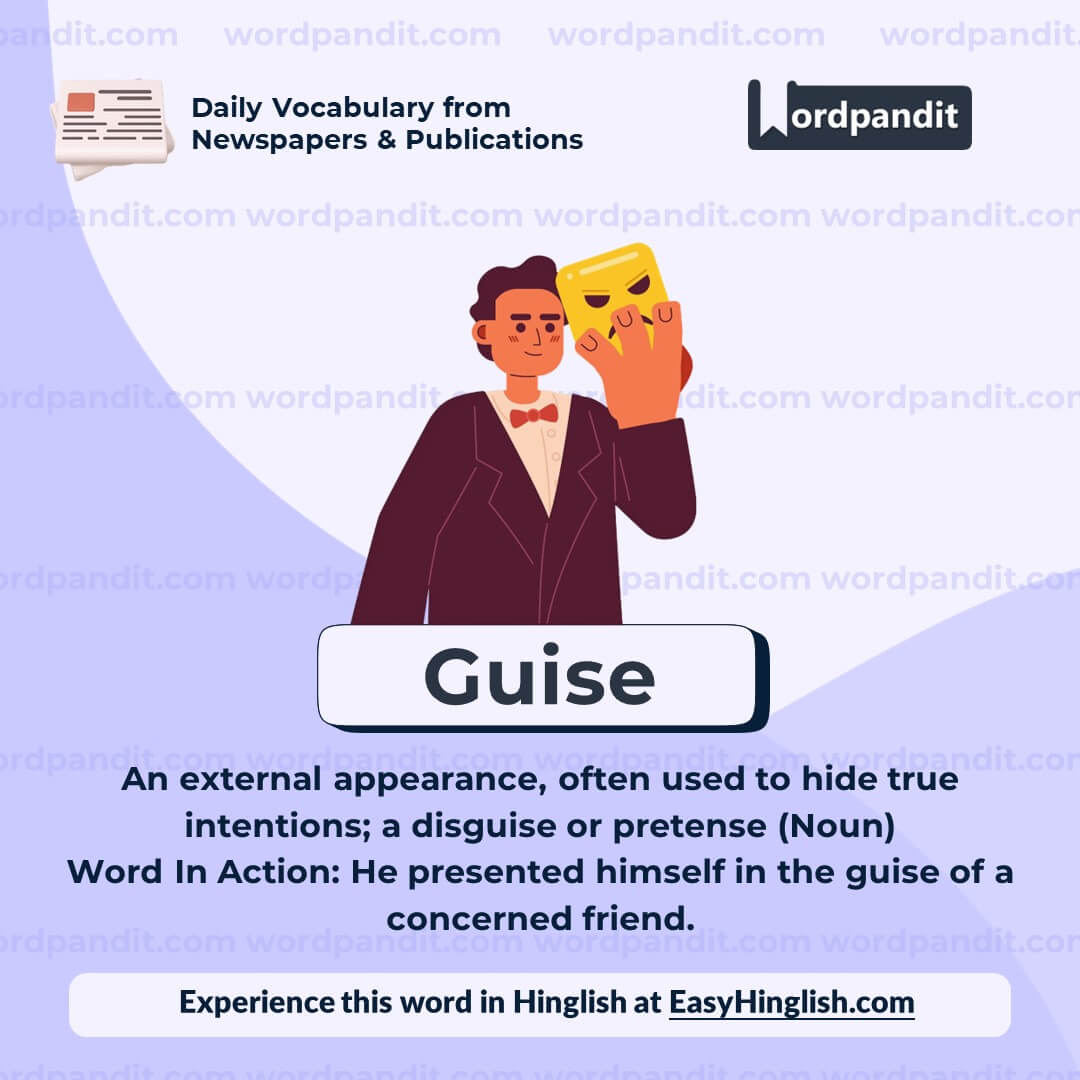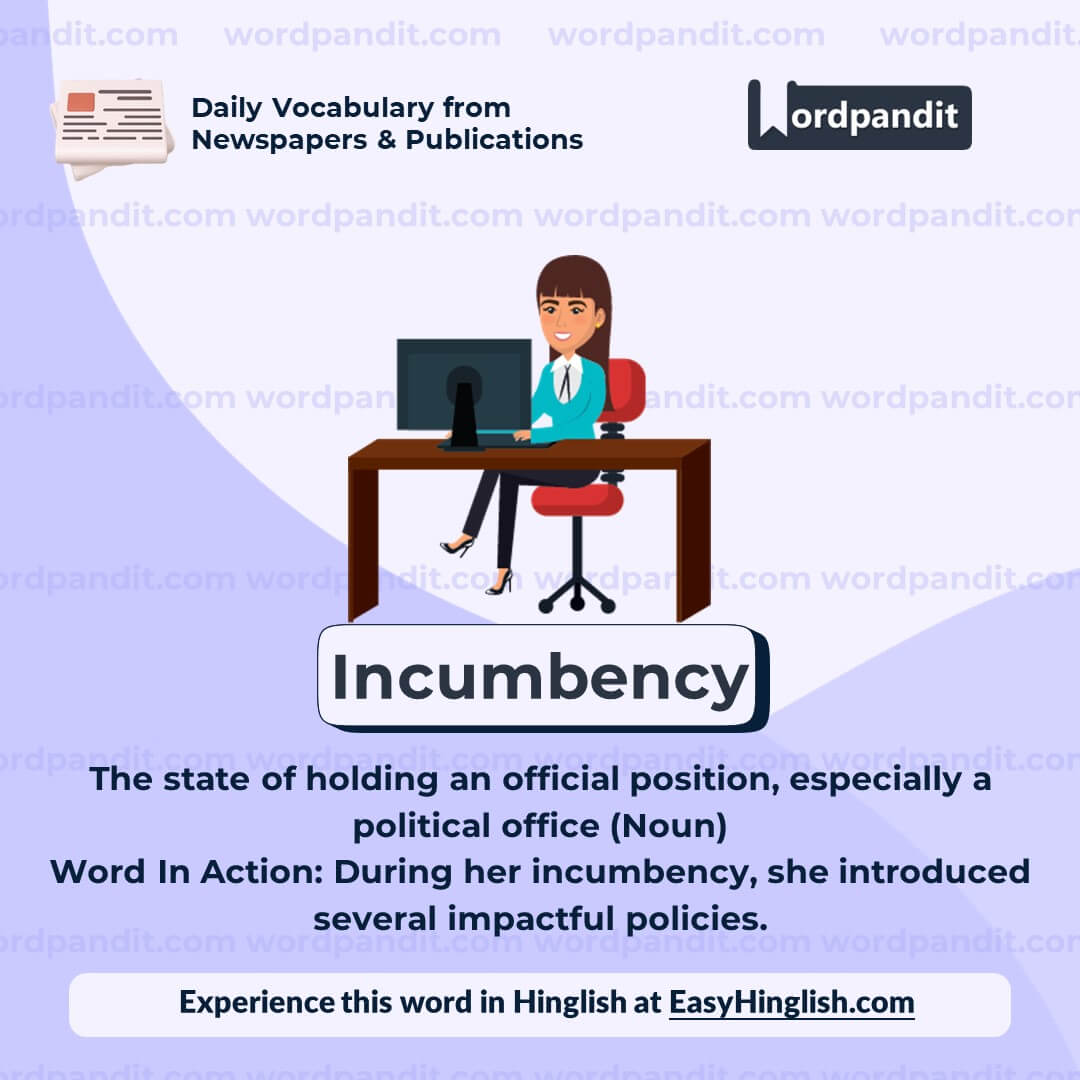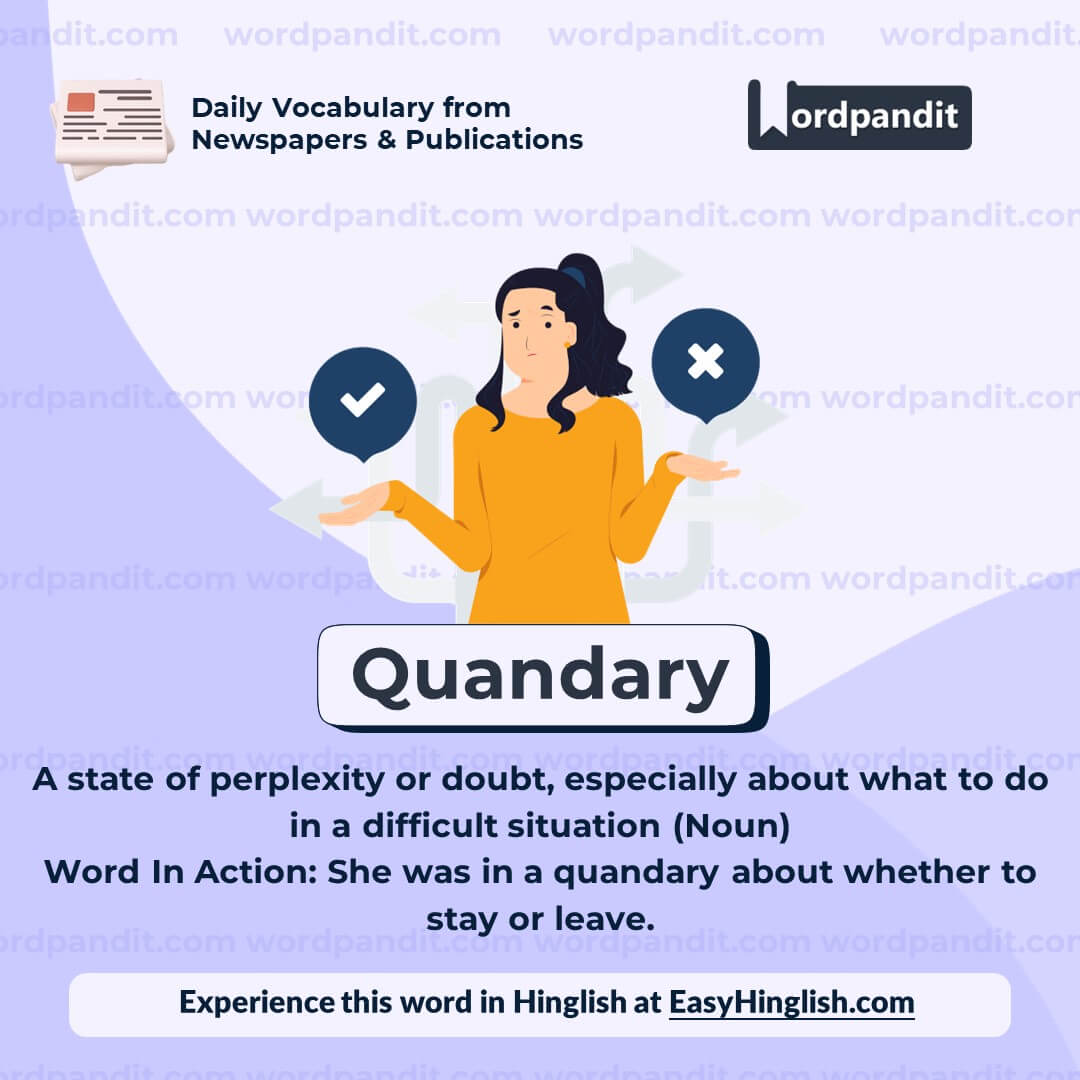Daily Vocabulary from Indian Newspapers and Publications
Welcome to Wordpandit’s Indian Vocabulary Hub
At Wordpandit, we understand the importance of staying rooted in the local context while expanding your language skills. This section focuses on enriching your vocabulary with words and phrases drawn from India’s leading newspapers and publications, ensuring you're learning vocabulary that is practical, relevant, and uniquely Indian.
Why Indian Sources Matter
We believe that the best way to master any language is by immersing yourself in local content. That’s why we carefully curate vocabulary from top Indian publications, including:
- The Hindu
- The Times of India
- The Economic Times
- Hindustan Times
- Live Mint
- The Indian Express
- And many others...
Stay Updated, Stay Relevant
With daily updates from Indian news sources, you’ll be consistently learning words that reflect the trends and shifts in Indian society and culture. Our focus is to provide vocabulary that enhances your understanding of the language in an Indian context.
How Wordpandit Supports Your Goals
Whether you’re preparing for exams, aiming to improve your professional communication, or simply want to stay connected with the latest Indian vocabulary, Wordpandit is here to guide you every step of the way.
Learn with a Practical Approach
Our interactive learning methodology includes real-world examples, engaging activities, and context-specific usage to ensure that every word becomes part of your active vocabulary.
Dive into Indian Vocabulary Today!
Why Choose Wordpandit?
Practical Learning: Focus on words you'll actually encounter in real-world reading, enhancing your comprehension and communication skills.
Diverse Content: From current affairs to scientific breakthroughs, our varied sources expose you to vocabulary across multiple domains.
Effortless Integration: Make Wordpandit a part of your daily routine. Just a few minutes each day can significantly boost your lexicon over time.
Your Path to Vocabulary Mastery
- Visit our Daily Vocabulary section regularly
- Explore new words and their usage in context
- Practice incorporating these words into your own writing and speech
- Track your progress as your vocabulary expands
Start Your Journey Today
Embark on your vocabulary enhancement journey with Wordpandit. By consistently engaging with our daily posts, you'll build a robust vocabulary that serves you well in academic, professional, and personal contexts.
Remember, a word a day keeps linguistic limitations at bay. Make Wordpandit your daily companion in the quest for vocabulary excellence!
WORD-1: Seismic
Context:
"For someone like me, shaped by the rituals of deference and the rigid hierarchies of the Indian education system, this was more than surprising – it was seismic." - The Wire
Explanatory Paragraph:
The word "seismic" primarily refers to something related to earthquakes or vibrations of the Earth's crust. However, in a figurative sense, it is used to describe something of massive or groundbreaking impact that shakes the very foundation of a system, idea, or situation. In the given context, "seismic" is used metaphorically to emphasize a profound, game-changing experience.
Meaning: Of or relating to earthquakes, or figuratively, something having a huge and often transformative impact. (Adjective)
Pronunciation: SIGHZ-mik
Difficulty Level: ⭐⭐⭐ Intermediate
Etymology: Derived from the Greek word "seismos," meaning "a shaking or shock," and the suffix "-ic," indicating "pertaining to."
Synonyms & Antonyms:
Synonyms: Earth-shaking, groundbreaking, momentous, revolutionary
Antonyms: Insignificant, trivial, minor, negligible
Usage Examples:
- The invention of the internet had a seismic impact on how people communicate and access information.
- Her resignation caused a seismic shift in the company’s leadership structure.
- Scientists monitored the seismic activity in the region after the volcano's eruption.
- The new policy introduced a seismic change in the education system, benefiting millions of students.
Cultural Reference:
"Seismic shifts in global politics are often triggered by seemingly minor events, demonstrating the interconnectedness of modern society." - This phrase is frequently used in geopolitical discussions to highlight significant changes in international dynamics.
Think About It:
Can you think of a moment in your life that caused a seismic shift in your beliefs or perspectives? How did it shape your actions afterward?
Quick Activity:
Write a short paragraph using the word "seismic" in both its literal and figurative senses. For example, describe a natural disaster and a transformative life event.
Memory Tip:
Think of "seismic" as connected to "seismograph," the tool used to measure earthquakes. Just as earthquakes shake the Earth, seismic events shake things up, either physically or metaphorically.
Real-World Application:
The word "seismic" is widely used in news and media to describe events that have massive repercussions, such as political revolutions, technological breakthroughs, or natural disasters. Understanding this word can help you better comprehend articles about major changes and their impacts.
WORD-2: Irreverence
Context:
"What struck me in those American classrooms was not irreverence or disorder but a different kind of respect – one which, unlike in India, was not conferred by title or demanded through hierarchy but earned through substance." - The Wire
Explanatory Paragraph:
"Irreverence" refers to a lack of respect for things that are usually taken seriously, such as authority, traditions, or conventions. It does not necessarily imply rudeness but rather a bold or unconventional attitude that questions established norms. In the given context, the word is used to contrast a perceived lack of reverence with the presence of a more merit-based respect system in American classrooms.
Meaning: A lack of respect for people or things that are generally respected or revered. (Noun)
Pronunciation: ih-REV-er-uhns
Difficulty Level: ⭐⭐⭐ Intermediate
Etymology: Derived from the Latin word "irreverentia," where "in-" means "not" and "reverentia" refers to "respect or reverence."
Synonyms & Antonyms:
Synonyms: Disrespect, flippancy, impertinence, cheekiness
Antonyms: Reverence, respect, deference, admiration
Usage Examples:
- The comedian’s irreverence for political correctness earned him both fans and critics.
- Her irreverence for outdated traditions made her a pioneer in the field of social reform.
- The student’s irreverence toward authority was evident in his witty, sarcastic remarks.
- Irreverence can be refreshing in a world dominated by rigid conformity.
Cultural Reference:
One of the most famous examples of irreverence is seen in the works of Mark Twain, whose sharp humor and critiques of societal norms challenged the conventions of his time. His writings continue to resonate because of their bold and irreverent tone.
Think About It:
Is irreverence always a bad thing? Can questioning authority or tradition in an irreverent way lead to positive change, or does it risk creating unnecessary disorder?
Quick Activity:
Think of a historical figure or artist known for their irreverence. Write a few sentences about how their bold attitude led to significant cultural or societal change.
Memory Tip:
To remember "irreverence," think of the prefix "ir-" meaning "not" and "reverence" meaning "respect." Together, it means "not showing respect." Picture someone humorously breaking a rigid rule to make the meaning stick!
Real-World Application:
"Irreverence" is often used to describe attitudes in comedy, art, and social movements where people challenge norms or question authority. Understanding this word can help you interpret critical or unconventional perspectives in culture and media.
WORD-3: Guise
Context:
"Under the guise of friendship, he sought to undermine their plans and promote his own interests." - Original Example
Explanatory Paragraph:
The word "guise" refers to an outward appearance or a form that conceals the true nature of something. It is often used to describe a deceptive appearance or pretense, though it can also simply mean a manner or form in which something is presented. In the given context, "guise" implies that the person pretended to be friendly but had hidden motives.
Meaning: An external appearance, often used to hide true intentions; a disguise or pretense. (Noun)
Pronunciation: GYZE
Difficulty Level: ⭐⭐ Beginner
Etymology: Originates from Old French "guise," meaning "manner" or "style," which traces back to Germanic roots.
Synonyms & Antonyms:
Synonyms: Pretense, facade, semblance, disguise
Antonyms: Reality, truth, authenticity, candor
Usage Examples:
- He presented himself under the guise of a helpful mentor, but his intentions were far from genuine.
- The thief entered the building in the guise of a delivery person.
- The event was organized in the guise of a charity fundraiser but was actually a political rally.
- Her kindness was not a guise; it was a reflection of her genuine nature.
Cultural Reference:
The term "guise" is often used in literature to describe characters who adopt false appearances. For instance, in Shakespeare’s "Twelfth Night," Viola disguises herself as a man under the guise of "Cesario," which creates comedic and dramatic tension throughout the play.
Think About It:
Can you think of a time when someone or something appeared different from its true nature? How did it affect your perception of the situation?
Quick Activity:
Write a short story or paragraph using the word "guise" to describe a character who pretends to be something they are not. Be creative in illustrating their motives and the outcome of their deception.
Memory Tip:
Remember "guise" by associating it with "disguise." Both words involve hiding or presenting a false appearance, but "guise" is the more general term for any form or manner of appearance.
Real-World Application:
The word "guise" is frequently used in journalism, literature, and everyday conversations to describe situations where appearances are deceptive or not as they seem. Recognizing this word helps in understanding nuanced texts and discussions about hidden motives or false representations.
WORD-4: Incumbency
Context:
"The saffron party is thus relying on Brand Modi, caste and faith-based polarisation, and anti-incumbency sentiment to upstage the AAP in absence of a leader who can steer the party." - The Wire
Explanatory Paragraph:
"Incumbency" refers to the condition of holding a specific position, role, or office, especially in politics. The term is often used in the context of elections, where it denotes the current holder of an office or the advantages and disadvantages associated with being in power. In the given context, "anti-incumbency" refers to the dissatisfaction or negative sentiment among voters toward the current ruling party or leader, which can influence electoral outcomes.
Meaning: The state of holding an official position, especially a political office. (Noun)
Pronunciation: in-KUHM-ben-see
Difficulty Level: ⭐⭐⭐ Intermediate
Etymology: From the Latin word "incumbere," meaning "to lie down on" or "to apply oneself to." The term evolved to mean "holding office" in political and administrative contexts.
Synonyms & Antonyms:
Synonyms: Tenure, term of office, occupancy
Antonyms: Vacant position, non-occupancy
Usage Examples:
- The incumbent president is seeking re-election after a successful first term.
- Anti-incumbency sentiment often arises when voters feel the government has not delivered on its promises.
- Incumbency comes with both advantages, such as name recognition, and disadvantages, like public scrutiny.
- The party leveraged the anti-incumbency wave to secure a landslide victory in the elections.
Cultural Reference:
In the context of Indian politics, "anti-incumbency" is a widely discussed phenomenon. For example, in many state elections, long-term dissatisfaction with the ruling party often leads to a strong anti-incumbency wave, paving the way for opposition parties to rise to power.
Think About It:
What factors contribute to anti-incumbency sentiment? Do you think voters are justified in wanting change even if the incumbent government has performed well?
Quick Activity:
Write a short paragraph about a recent election in your country. Highlight how incumbency or anti-incumbency sentiments played a role in the outcome.
Memory Tip:
Think of "incumbency" as being "in-cabin" or "in-office." The word "incumbent" refers to the person currently occupying a position, while "incumbency" is the state of holding that position.
Real-World Application:
Understanding "incumbency" helps in analyzing political trends and electoral dynamics. It is frequently used in political commentary, news reports, and debates to describe the performance, challenges, and advantages of current officeholders, especially during elections.
WORD-5: Quandary
Context:
"Barely has the BJP found itself in such a quandary where it hopes for the revival of its biggest political rival." - The Wire
Explanatory Paragraph:
A "quandary" is a state of uncertainty or confusion, especially when faced with a difficult choice or a perplexing situation. It is often used to describe a scenario where there are no clear or easy solutions. In the given context, the BJP finds itself in a difficult position, as it is ironically hoping for the resurgence of a rival, highlighting the complexity of its situation.
Meaning: A state of perplexity or doubt, especially about what to do in a difficult situation. (Noun)
Pronunciation: KWAHN-duh-ree
Difficulty Level: ⭐⭐⭐ Intermediate
Etymology: Derived from the Latin word "quando," meaning "when," which evolved into "quandary" in the 16th century, signifying a state of doubt or perplexity.
Synonyms & Antonyms:
Synonyms: Dilemma, predicament, uncertainty, perplexity
Antonyms: Certainty, clarity, resolution, assurance
Usage Examples:
- She was in a quandary over whether to accept the lucrative job offer or stay in her current, stable position.
- The government's quandary about how to address the economic crisis became the subject of national debate.
- John found himself in a moral quandary when asked to choose between loyalty to his friend and reporting the truth.
- The committee's quandary about whether to expand the project or cancel it altogether led to a lengthy discussion.
Cultural Reference:
The word "quandary" is often used in literature and media to highlight complex situations faced by characters. For instance, Hamlet's famous soliloquy, "To be, or not to be," exemplifies a profound quandary, as he wrestles with the existential dilemma of life and death.
Think About It:
Have you ever faced a personal or professional quandary where neither option seemed ideal? How did you navigate the situation?
Quick Activity:
Write a short paragraph describing a fictional character in a quandary. Explain their situation, the choices they face, and the emotions they experience.
Memory Tip:
To remember "quandary," think of "wandering" through a maze of uncertainty, as the word reflects a state of being lost or confused about what to do.
Real-World Application:
The word "quandary" is useful in describing personal challenges, organizational dilemmas, or political predicaments. It is frequently used in news, literature, and conversations to express uncertainty in decision-making or strategy.


